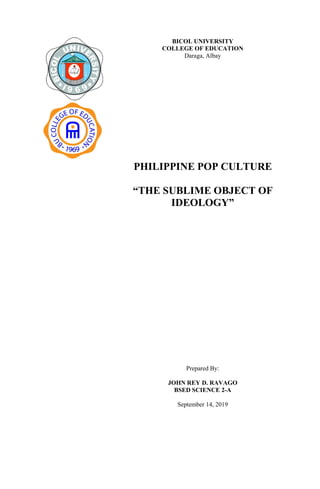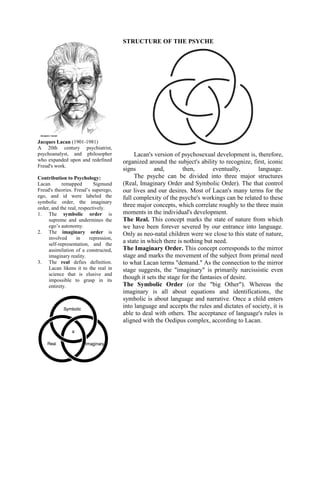The Sublime Object of Ideology
- 1. BICOL UNIVERSITY COLLEGE OF EDUCATION Daraga, Albay PHILIPPINE POP CULTURE ŌĆ£THE SUBLIME OBJECT OF IDEOLOGYŌĆØ Prepared By: JOHN REY D. RAVAGO BSED SCIENCE 2-A September 14, 2019
- 2. Slavoj z├«z├¬k (1949) Slovene philosopher and cultural theorist whose works addressed themes in psychoanalysis, politics, and popular culture. Sigmund Freud (1856-1939) An Austrian neurologist and the founder of psychoanalysis, who created an entirely new approach to the understanding of the human personality. FreudŌĆÖs Personality Components 1) Id- operates on the pleasure principles. 2) Ego- operates using the reality principle. 3) Superego- embodies a personŌĆÖs personŌĆÖs moral aspect. MIRROR STAGE The mirror stage describes the formation of the Ego via the process of identification, the Ego being the result of identifying with one's own specular image. At six months the baby still lacks coordination; however, Lacan hypothesized that the baby can recognize itself in the mirror before attaining control over its bodily movements. The child sees its image as a whole, but this contrasts with the lack of coordination of the body and leads the child to perceive a fragmented body. This contrast, Lacan hypothesized, is first felt by the infant as a rivalry with its own image, because the wholeness of the image threatens it with fragmentation; thus the mirror stage gives rise to an aggressive tension between the subject and the image. To resolve this aggressive tension, the subject identifies with the image: this primary identification with the counterpart is what forms the Ego. The mirror stage, Lacan also hypothesized, shows that the Ego is the product of misunderstanding -"m├®connaissance" implies a false recognition. Additionally, the mirror stage is where the subject becomes alienated from itself, and thus is introduced into the Imaginary order. THE SUBLIME OBJECT OF IDEOLOGY
- 3. Jacques Lacan (1901-1981) A 20th century psychiatrist, psychoanalyst, and philosopher who expanded upon and redefined Freud's work. Contribution to Psychology: Lacan remapped Sigmund Freud's theories. FreudŌĆÖs superego, ego, and id were labeled the symbolic order, the imaginary order, and the real, respectively. 1. The symbolic order is supreme and undermines the egoŌĆÖs autonomy. 2. The imaginary order is involved in repression, self-representation, and the assimilation of a constructed, imaginary reality. 3. The real defies definition. Lacan likens it to the real in science that is elusive and impossible to grasp in its entirety. STRUCTURE OF THE PSYCHE Lacan's version of psychosexual development is, therefore, organized around the subject's ability to recognize, first, iconic signs and, then, eventually, language. The psyche can be divided into three major structures (Real, Imaginary Order and Symbolic Order). The that control our lives and our desires. Most of Lacan's many terms for the full complexity of the psyche's workings can be related to these three major concepts, which correlate roughly to the three main moments in the individual's development. The Real. This concept marks the state of nature from which we have been forever severed by our entrance into language. Only as neo-natal children were we close to this state of nature, a state in which there is nothing but need. The Imaginary Order. This concept corresponds to the mirror stage and marks the movement of the subject from primal need to what Lacan terms "demand." As the connection to the mirror stage suggests, the "imaginary" is primarily narcissistic even though it sets the stage for the fantasies of desire. The Symbolic Order (or the "big Other"). Whereas the imaginary is all about equations and identifications, the symbolic is about language and narrative. Once a child enters into language and accepts the rules and dictates of society, it is able to deal with others. The acceptance of language's rules is aligned with the Oedipus complex, according to Lacan.



